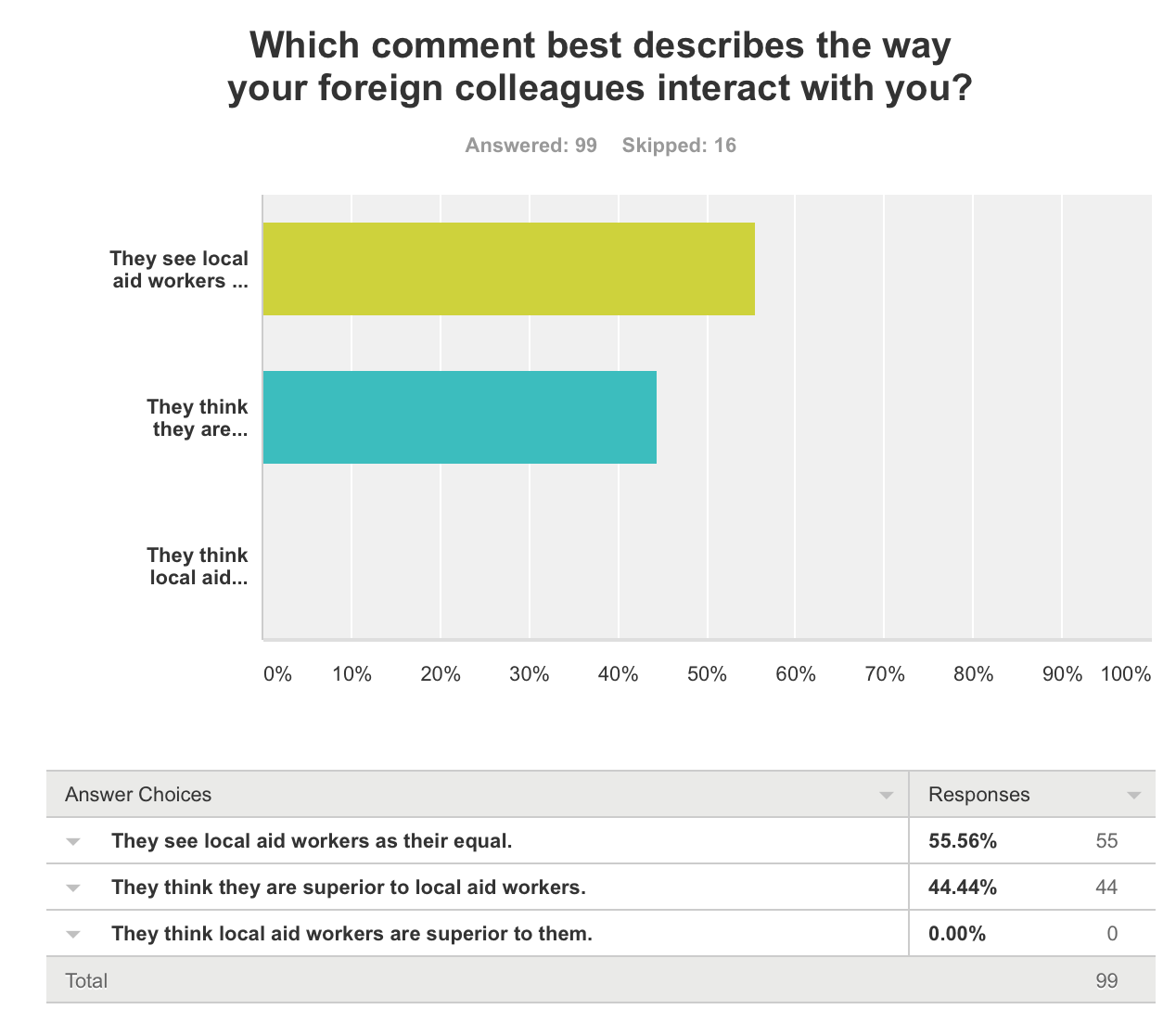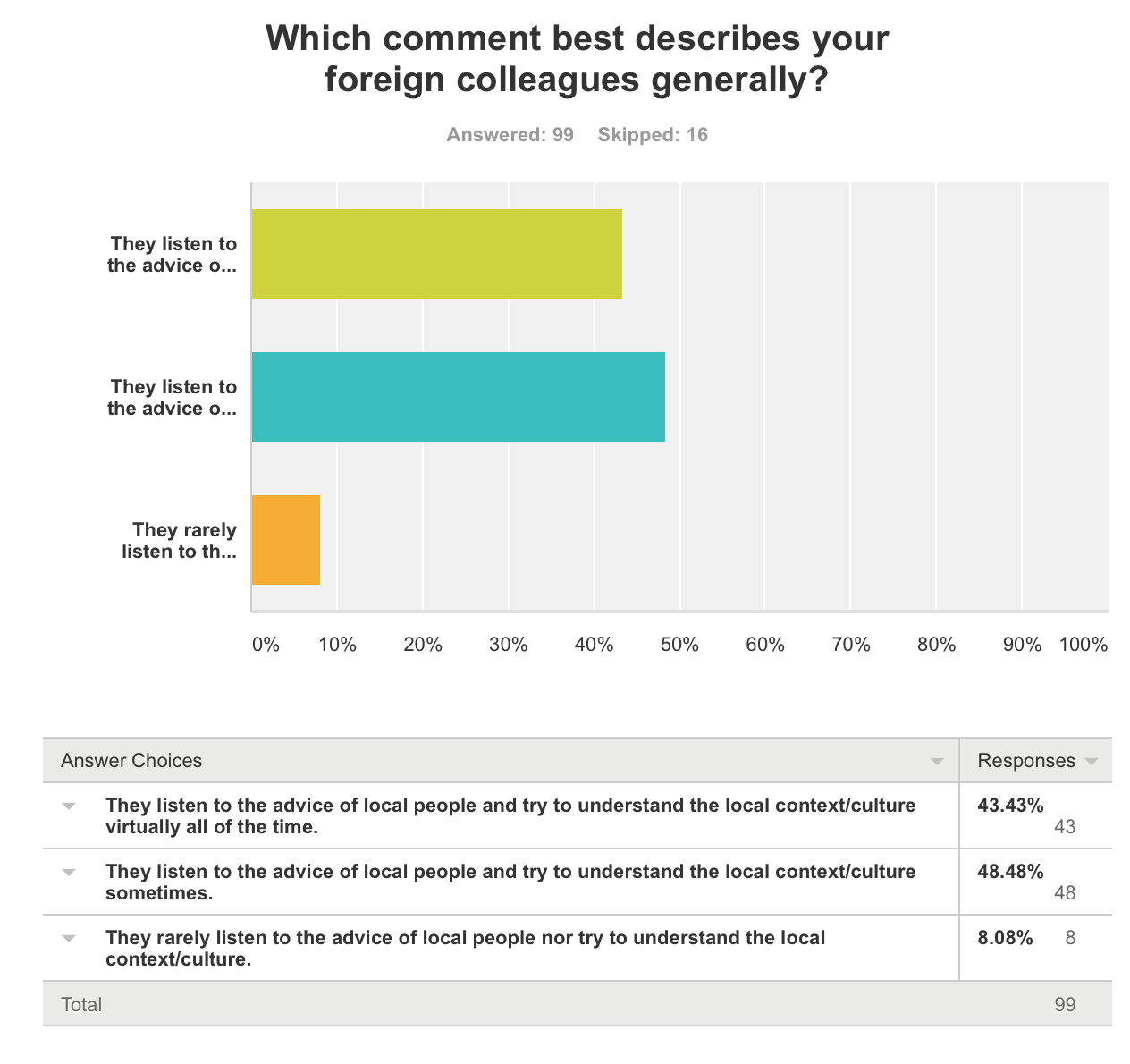“Expat dev workers, after a day or two in the PH, believe they know what’s bugging the country.”
-veteran male Filipino aid worker
The local – expat relationship
Context
Here we continue to explore the results of our survey of Filipino aid and development workers. Look here and here and here and here and here for our preious posts and here for our methodology notes. As we get to the end of our data analysis we will write one ‘executive summary’ report, likely in several weeks. Our ultimate goal is to have the full results presented in article form.
 How locals think they are viewed by expats
How locals think they are viewed by expats
One of the main goals of our survey was to explore the relationship between local aid and development workers and their expat colleagues. Here is some of what we found.
Most of our sample (64%) work directly with expats in the same office or space and the vast majority -80%- reported having “a positive working experience with foreign colleagues.”
Near the middle of the survey we asked simply, “Which comment best describes the way your foreign colleagues interact with you?” and 44% answered “They [foreign colleagues] think they are superior to local aid workers.”
A second question probed for an additional dimension of this same topic. Nearly half -49%- of the respondents noted, regarding interactions with their foreign colleges, that, “They listen to the advice of local people and try to understand the local context/culture sometimes (emphasis added).” Another 8% indicated, “They rarely listen to the advice of local people nor try to understand the local context/culture.” In sum well over half -57%- responded in a way that indicates they feel less than fully respected by their expat counterparts.
That’s the glass half empty view. What do you see when you look at the data below?
So here’s what I am seeing from the quantitative data. Filipino aid workers believe they are getting compensated far less for doing the same job, many sense that expats feel they are superior to them, feel less than respected by their expat colleagues, and yet, tellingly, the vast majority have a positive experience working with expats.
Some local aid worker voices
Beyond the numbers are the many respondents who took the time to elaborate on their views and opinions. Below are responses to our open-ended question, “Please elaborate on any of your answers above about working with non-Filipino colleagues” which will serve to add useful nuance to the quantitative data.
One female working for an international organization with its HQ based outside of the Philippines observed,
“In the more than 20 yrs of my devpt work experience, non-Filipino colleagues generally receive special treatments from their local counterparts in the Philippines. [They have] bigger pay, better benefits, more security clout. Local aid workers has to be constantly on its toes trying to get them be acquainted in local situations to protect them. Foreign technical consultants such as scientists, engineers etc oftentimes feels that they are more superior than local professionals within the organization.”
A male doing aid/relief work wrote,
“Most of them travel in the Philippines in parachutes. What I mean is that they travel here without the full understanding of the context and culture. Without the local staff, they cannot deliver their work. But we, as local staff, are the frontliners especially on dealing with the Local government units and the communities. Our reports are theirs. Our accomplishments are theirs. Most of the time, local staff look at them as more skilled, more superior. They are paid way more than what the local staff receives.”
A few responses were very critical. This local worker vents,
“Expats get paid way higher than local aid workers. It is the local aid workers who are doing the actual tasks. Expats consult Filipinos for technical inputs because they come here lacking technical knowledge and experience yet they grab the credit from the Filipino employees. The expats are the ones being promoted, and the Filipinos remain in the rank and file for several years. Worse, Filipinos are treated like slaves in their very own country.”
There were many positive comments as well, these two female offerings,
“My non-Filipino colleagues loves the Filipino culture and has always been open to the idea of discovering/understanding the local context of Filipino social issues.”
“…its a great previllege working with them such an honor.“
Not final thoughts
There is so much analysis and parsing out of the results above (and the results to come) yet to be done.
What I am sensing very clearly is that there are more questions being raised than there are answers being given; such is the case with all exploratory research. That said, my sociological instincts tell me that (1) there will be no complete set of answers forthcoming but that (2) the discussions about the issues raised will all have to deal with complexities inherent in all of the questions.
Yes, the ‘local-expat’ relationship is complicated.
I’ll have more to say about this post soon, so check back for an updated version. In the meantime you can contact me here.




 Follow
Follow